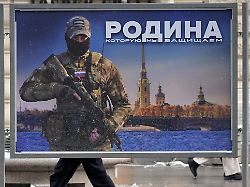Seven years in prison instead of five
Prigozhin wants harsher penalties for war critics
03/01/2023 8:57 p.m
Reporting on the atrocities in Ukraine is banned in Russia. Prigozhin is now calling for the maximum penalty to be increased and applied to everyone – except for commanders. Otherwise, the Wagner boss fears being prosecuted himself.
After reports of Russian war crimes in Ukraine, Moscow wants to significantly tighten the penalties for “denigrating” its own fighters. While previously “discrediting” the Russian army could be punished with imprisonment, in future this will apply to all fighting units in Ukraine, including businessman Yevgeny Prigozhin’s private Wagner army. In addition, the maximum sentence is to be raised from five to up to seven years in prison. Because the soldiers are still often criticized despite the harsh laws introduced in the course of the war, the threat of harsher punishment should now have a more deterrent effect.
Prigozhin, who is a confidant of Kremlin chief Vladimir Putin, had called for the law to be changed himself. Parliament leader Vyacheslav Volodin immediately took up the initiative and initially even spoke of a possible threat of punishment of up to 15 years in prison. The second and decisive reading is planned for this Thursday, the third and formally final on March 14th. However, in a letter to Volodin, Wagner boss Prigozhin demanded that at least commanders – that is, himself – should have the opportunity to criticize.
Prigozhin himself fears prosecution
Prigozhin had repeatedly criticized the Russian military leadership, sometimes insulted it for mistakes and defeats in the Ukraine war zone. Now Prigozhin fears that he himself could be prosecuted. The law should not extend to those responsible, he said. “Otherwise, any public and constructive criticism can lead to being held accountable,” Prigozhin wrote. The changes to the law should mean that not only the soldiers but also the voluntary fighters, including the Wagner mercenaries, are better protected than before.
Human rights activists and independent lawyers accuse Russian attackers in Ukraine of the most serious war crimes. Reports of such acts are banned in Russia. Citizens are often prosecuted under the law for even the slightest criticism of the Russian invasion, albeit mostly with fines. The Russian judiciary has been criticized internationally for applying laws arbitrarily and staging accusations in order to silence those who think differently.
